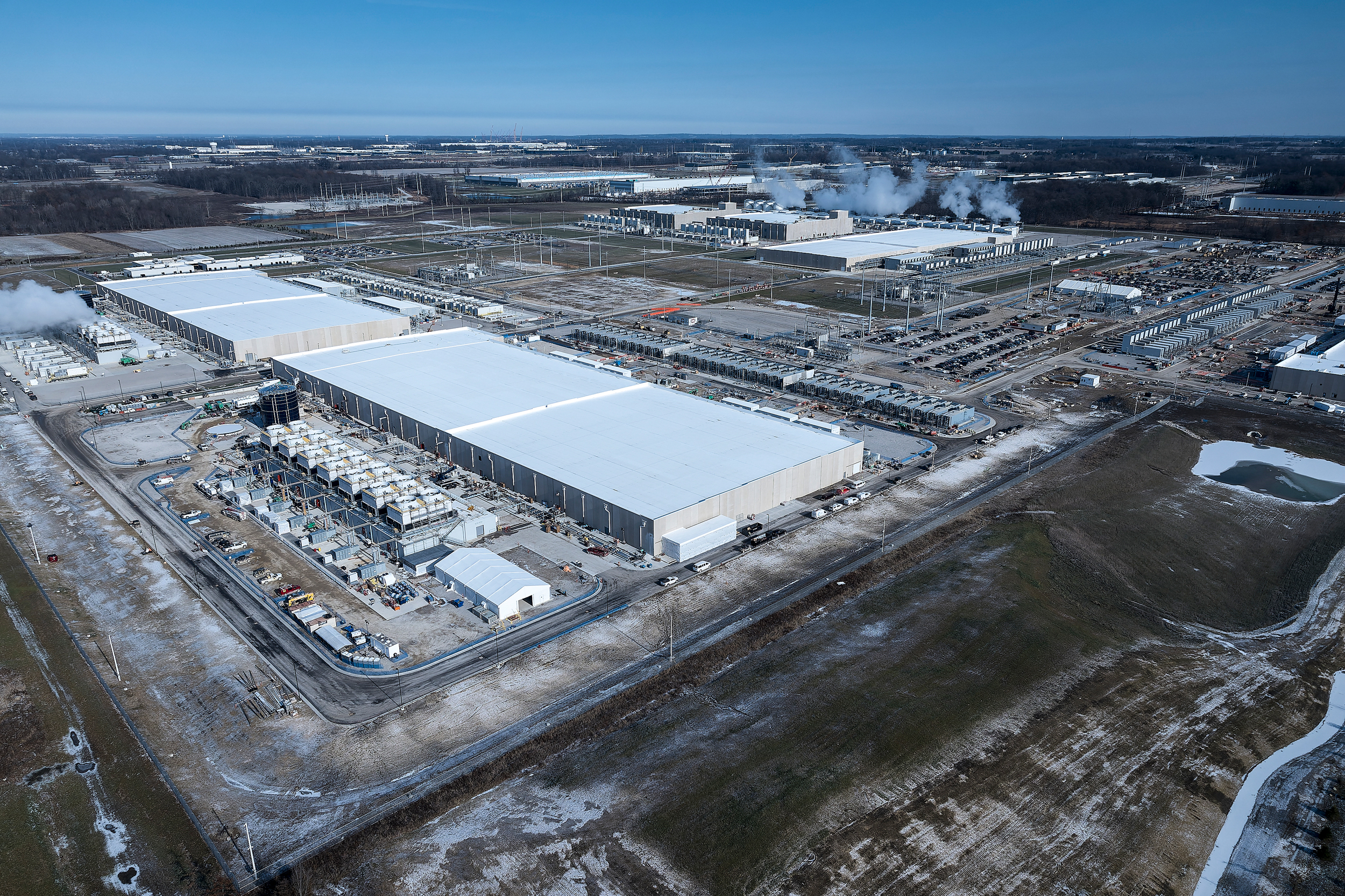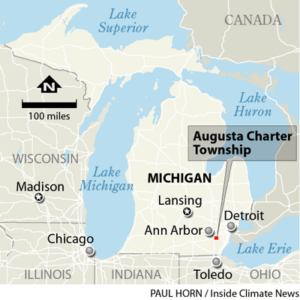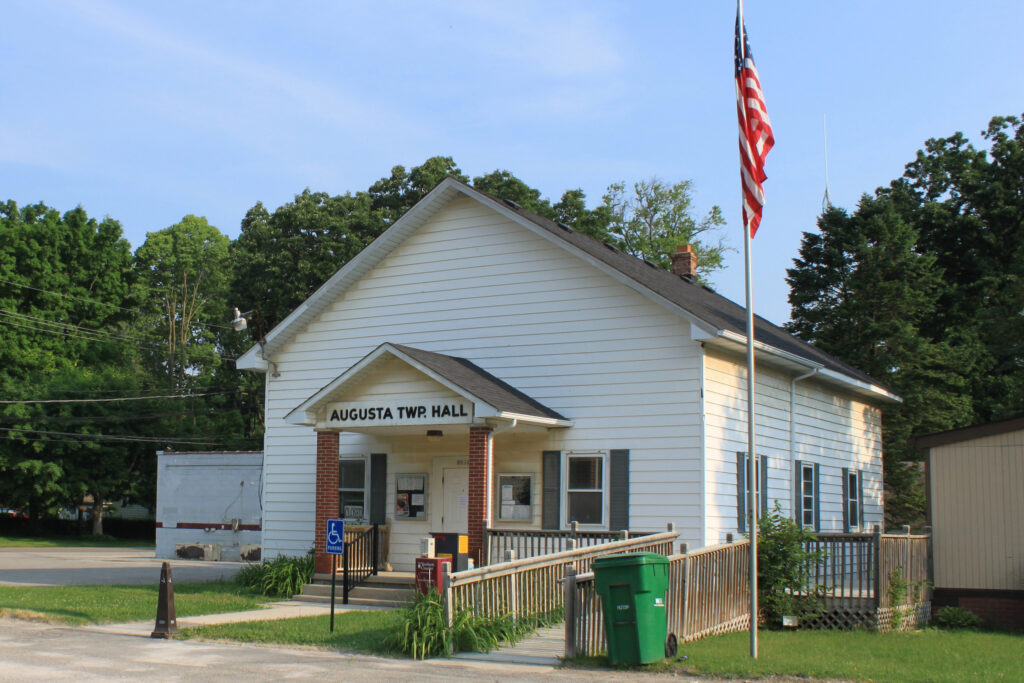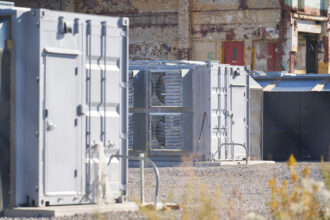This is the second of three articles about Michigan communities organizing to stop the construction of energy-intensive computing facilities.
Early this year, Augusta Charter Township resident Travis Matts had seen a few headlines about the problems data centers caused in towns across the country. He thought the impacts on water, air and utility bills sounded awful, but it also seemed like a far-away issue.
Until it suddenly hit home in May.
That is when Matts learned, through his group of volunteers that cleans up area litter, that a data center was proposed for an 822-acre property largely in Augusta Township, a small farming community southeast of Ann Arbor. Township leadership fully supported it.
Matts and others responded by quickly forming a new residents group in opposition, and began collecting ballot initiative signatures to put a rezoning for the data center in front of voters. The debate consumed local politics and bitterly divided some residents in this town of about 8,000 people, leading to accusations of harassment and threats.
“It’s sad that we residents have to fight as hard as we do to keep these facilities out of our backyards, but if we don’t then who will?” he asked. “We’re taking it into our own hands.”
By August, the group, Protect Augusta Charter Township (PACT), had collected enough signatures for a referendum, and PACT is confident residents will vote the project down, Matts added.
The grassroots effort is part of a growing number of municipal fights that are playing out in towns throughout Michigan—and across the U.S.—that could derail data center plans. The centers are opposed by people from across the political spectrum, and the controversy here is unfolding as neighboring Saline Township rejected a similar data center plan in September.
In Augusta Township, the proposal has pitted nearly 1,000 residents who signed the ballot initiative against the township Board of Trustees, which in July unanimously approved the rezoning, and the developer behind the proposal, New York City-based real estate firm Thor Equities.
Thor builds data centers but has not announced a client, though a planning report noted tech companies like Google and Microsoft use the type of facility that is proposed here. The centers typically house infrastructure for artificial intelligence and other computing uses.

Few details on how the center would look are yet available, but it would include at least five large buildings on what is currently farmland and wetlands, according to plans. The center may consume 1 million gallons of water daily, local news outlet MLive reported, and would include large generators.
The Board of Trustees and supporters point to potential benefits, including increased tax revenue for the financially struggling township, and water and sewer infrastructure improvements.
“It would just be so huge for us,” said Augusta Township Clerk Kim Gonczy. The level of tax revenue is still unclear, she said, but added it is likely “millions of dollars.”
“It could make such a big difference for the township,” she added.

The project’s opponents questioned the economic impact. They fear an increase in noise and light pollution, and that the massive facility would destroy Augusta’s rural character while pushing up utility bills and causing brownouts. PACT’s effort is about preserving the “sense of place,” said Matts, whose family has lived in Augusta for 100 years.
“With this data center plan they’re basically saying, ‘We know that, but business is more important,’” Matts said. “Landscape and preserving the identity of a place does not register on their needs list.”
Residents needed to collect 561 signatures to get the issue on the ballot, and they turned in 957 gathered during an approximately two-week period in August. Township officials must certify the signatures, then develop language for the ballot that will be voted on during a special election in May 2026 at the earliest. Matts estimated PACT spoke with 1,200 to 1,400 residents, and a strong majority signed the petition.
As data centers’ financial and environmental tolls have become clearer, the public is broadly growing more concerned. In many communities, their massive electricity and water consumption has increased residential utility bills.
In Michigan and elsewhere, they have already required more fossil fuel plants to be built or stay open, and threaten to derail the transition to clean energy. Meanwhile, they can be a source of light, noise, water and air pollution.
The local battles playing out across the state are residents’ best line of defense, said Tim Minotas, legislative coordinator for the Sierra Club of Michigan.
“This is where people live and raise their family so in the absence of state or federal protections, it’s really the responsibility of our local communities to take a stand to protect themselves,” Minotas said.
“That’s Harassment”
An incident detailed in a previous news report and confirmed by four residents to Inside Climate News described how a township official in August allegedly called police on PACT members. PACT had set up a canopy and table on the side of the road to collect signatures for the ballot initiative near the township hall.
The responding officer allegedly found the campaigners had done nothing wrong, but asked them to move the table back from the road. PACT questioned the township’s intent.


Views of Township Hall and farmland in Augusta Charter Township, Mich. Credit: Dwight Burdette/CC BY 3.0
“Calling the cops, that’s harassment,” resident Deborah Fuqua-Frey, who is opposed to the project, said during a public comment session after the incident.
Gonczy did not respond to Inside Climate News questions about the incident. In a late-August statement to the news outlet Planet Detroit, Gonczy said the campaigners were set up too close to a dangerous intersection.
Meanwhile, residents said they have received anonymous handwritten notes in their mailboxes that they perceived as threats. Video shows the township supervisor, Todd Waller, would not allow residents to talk about the data center during public comment at board meetings. Some residents questioned the ethics of Waller’s rule, and said it was part of a larger pattern of officials trying to silence the project’s critics. Waller did not respond to requests for comment.
This story is funded by readers like you.
Our nonprofit newsroom provides award-winning climate coverage free of charge and advertising. We rely on donations from readers like you to keep going. Please donate now to support our work.
Donate NowThe local issues came after a battle in the state legislature in which progressive legislators sought to add consumer and environmental protections to incentives for data centers. Those were not included in the bills that passed, and may have helped alleviate some of the problems now being dealt with at the local level, said Denise Keele, director of the nonprofit Michigan Climate Action Network.
“It’s one thing if there is NIMBY-ism, and people saying ‘I don’t want this in my community,’ but with data centers the fears are real,” Keele said. “The centers suck up energy and more importantly they will raise our energy rates.”
Merits and Drawbacks
Township officials have downplayed PACT’s litany of issues with the project. Responding to concerns about light pollution, Gonczy said the property’s lights will be pointed toward the ground, so they won’t flood the surrounding region. She also told Inside Climate News that officials traveled to Toledo to visit a data center, used a noise meter to measure the decibels, and found the level would not violate Augusta Township ordinances.
Moreover, the project would be built in the township’s southwest corner, far away from most residents, Gonczy said. She added that she has not seen any evidence that it would decrease grid reliability or increase bills.
“I don’t understand all of that, and I don’t know where it’s coming from,” Gonczy told Inside Climate News.
Read More

A Bitcoin Mine Came to Michigan’s Upper Peninsula, and Dafter Township Isn’t Happy
By Tom Perkins
The project’s opponents see it differently. They argue that the financial benefit is not worth the cost, and still suspect the lights will be a problem.
“It won’t be dark at night because there are going to be acres and acres of lights,” said one township resident who declined to use her name for fear of retribution. “It’s no longer your dark cornfield because there’s a glow that never goes away.”
The project’s opponents also questioned the accuracy of the sound meter readings, and said those do not take into account the effects of a steady din. Data centers include generators that frequently run on diesel fuel, and those are used monthly as routine maintenance to ensure they work, which could contribute to air and noise pollution.
More important, Matts said, is the loss of the rural character. State leaders didn’t consider these issues, nor has Augusta Township’s Board of Trustees, Matts said, which he called “frustrating.”
“People have lived here for a long time and we understand that things come and go and there’s change and development, but something of this scale and magnitude—1,000 industrial acres—is asinine in a community like this,” Matts said.
Next: A school in Dafter Township in Michigan’s Upper Peninsula sues to stop a bitcoin mine that opened across the street.
About This Story
Perhaps you noticed: This story, like all the news we publish, is free to read. That’s because Inside Climate News is a 501c3 nonprofit organization. We do not charge a subscription fee, lock our news behind a paywall, or clutter our website with ads. We make our news on climate and the environment freely available to you and anyone who wants it.
That’s not all. We also share our news for free with scores of other media organizations around the country. Many of them can’t afford to do environmental journalism of their own. We’ve built bureaus from coast to coast to report local stories, collaborate with local newsrooms and co-publish articles so that this vital work is shared as widely as possible.
Two of us launched ICN in 2007. Six years later we earned a Pulitzer Prize for National Reporting, and now we run the oldest and largest dedicated climate newsroom in the nation. We tell the story in all its complexity. We hold polluters accountable. We expose environmental injustice. We debunk misinformation. We scrutinize solutions and inspire action.
Donations from readers like you fund every aspect of what we do. If you don’t already, will you support our ongoing work, our reporting on the biggest crisis facing our planet, and help us reach even more readers in more places?
Please take a moment to make a tax-deductible donation. Every one of them makes a difference.
Thank you,














